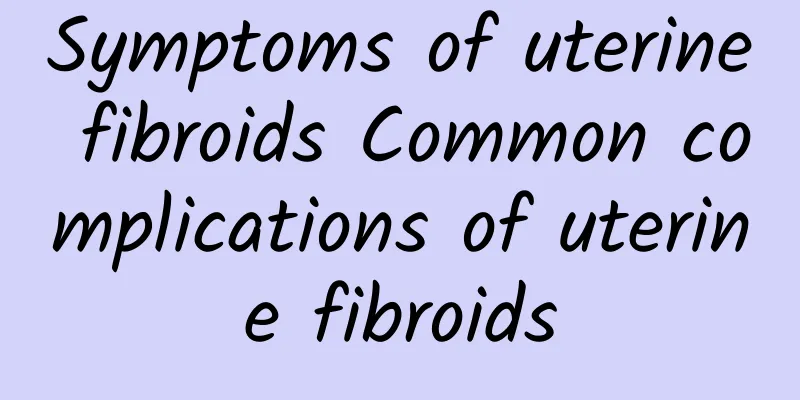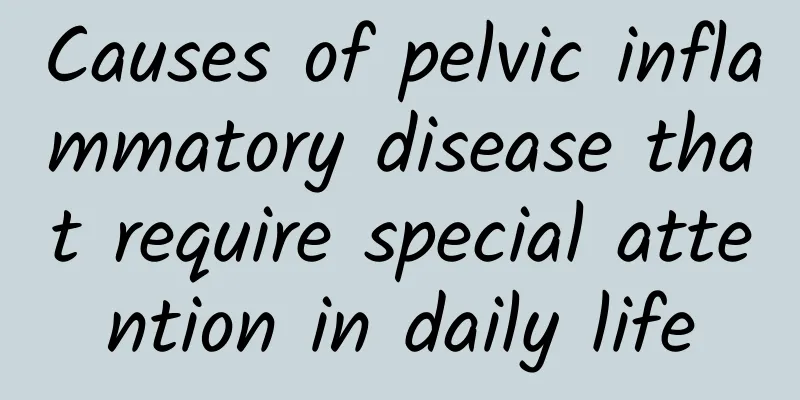Symptoms of uterine fibroids Common complications of uterine fibroids

|
The early symptoms of uterine fibroids are generally not obvious. In the early stages of the disease, they are generally not discovered by patients except for clinical examinations. However, this period of uterine fibroids generally does not affect the patient's body, but it must be known that if the uterine fibroids are severe, they can also cause complications. The following are the symptoms of uterine fibroids: 1. Menstrual changes: The most common symptoms are shortened menstrual cycle, increased menstrual volume, prolonged menstruation, irregular vaginal bleeding, etc. 2. Abdominal mass: abdominal distension, swelling in the lower abdomen, accompanied by a feeling of falling. 3. Increased vaginal discharge: Increased vaginal discharge, sometimes with a large amount of purulent and bloody discharge and necrotic tissue discharge with a foul odor. 4. Pain: Generally, patients do not have abdominal pain, but often have lower abdominal distension, back pain, etc. When the subserosal fibroid pedicle twists the uterine fibroid, acute abdominal pain, redness of the fibroid, severe abdominal pain, and fever may occur. 5. Compression symptoms: When the fibroid grows forward or backward, it can compress the bladder, urethra or rectum, causing frequent urination, dysuria, urinary retention or constipation. When the fibroid grows to both sides, it will form a broad ligament fibroid, compressing the ureter or hydronephrosis; if it compresses the pelvic blood vessels and lymphatic vessels, it will cause lower limb edema. 6. Infertility: Fibroids compress the fallopian tubes and cause them to twist, or deform the uterine cavity, hindering the implantation of the fertilized egg and leading to infertility. 7. Secondary anemia: If the patient has excessive menstruation for a long time, it may lead to secondary anemia, with symptoms such as general fatigue, pale complexion, shortness of breath, and palpitations. 8. Hypoglycemia: Hypoglycemia is also rare in uterine fibroids. The main symptoms are low fasting blood sugar, loss of consciousness, shock, and the symptoms completely disappear after glucose injection. After tumor resection, the symptoms of hypoglycemia completely disappear. |
<<: What are the symptoms of uterine fibroids? Can uterine fibroids lead to endometrial cancer?
>>: Symptoms of uterine fibroids Will uterine fibroids compress the bladder?
Recommend
What to eat during menstruation
During menstruation, eat iron-rich foods, fiber-r...
Daily dark green vegetables to supplement lutein (Part 2)
Lutein recipes Easy Garlic Oil Ingredients: 2 bul...
Where is the best hospital for uterine effusion?
Where is the best hospital for uterine effusion? ...
What factors can cause cervical erosion? How should cervical erosion be diagnosed?
I believe that most women pay great attention to ...
Don’t throw away the dragon fruit peel in a hurry! Full of betacyanin can fight cancer
If women want to replenish blood, eating iron-ric...
I have abdominal pain in late pregnancy, like dysmenorrhea, but my water has not broken and I have not seen any blood.
Abdominal pain in the late pregnancy is similar t...
What should I pay attention to after laparoscopic surgery for uterine fibroids?
What are the precautions after laparoscopic surge...
Experts analyze the main causes of mild cervical erosion
Among cervical erosions, mild cervical erosion is...
Stick exercise for fat loss and body shaping? 4 Myths of Stick Exercise
Stick exercises are becoming popular. Many people...
Symptoms of uterine fibroids
I believe that everyone is no longer unfamiliar w...
What are the nursing methods for threatened abortion?
What are the nursing methods for threatened abort...
Pay attention to personal hygiene to effectively prevent vaginitis.
Vaginitis is a common disease among female friend...
How to prevent threatened abortion through lifestyle changes
Many female friends will encounter many problems,...
Can I have sex if I have cervicitis? Is it contagious?
Patients with cervicitis should avoid sexual inte...
How to best deal with ectopic pregnancy
Generally speaking, there is no best way to deal ...









